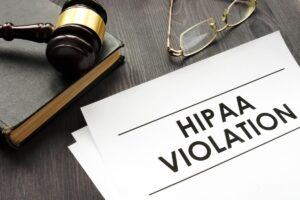You have worked hard to get the education and credentials necessary to become a licensed dietician and build your career. Unfortunately, you are now facing a complaint against your dietician license for violating a rule or law that applies to your profession. Even if the complaint is groundless, you must proactively protect your license and career. Contact a dietician license defense lawyer to help you with the complaint and any disciplinary proceedings before the Texas Department of Licensing & Regulation (TDLR).
How does the TDLR Process Complaints
TDLR licenses and regulates various occupations, including dieticians. TDLR also has an Enforcement Division that receives and investigates all complaints against dieticians. The first step is a preliminary evaluation to ensure that TDLR has jurisdiction over the licensee who is the subject of the complaint and there is reason to believe that a violation of a law or rule has occurred under 16 Tex. Admin. Code §116.21. These complaints may come from individual consumers or TDLR staff members. If TDLR staff find that the agency has both jurisdiction and reason to believe that the alleged violation has occurred, the Enforcement Division opens a formal case for investigation.
Investigating Complaints
TDLR assigns an investigator to each case, who typically will notify the licensee of the complaint, interview the complainant, licensee, and witnesses, and gather any written documentation relevant to the case. After completing the investigation, the investigator prepares an investigative report and submits it to a prosecuting attorney at TDLR. The prosecutor decides how to move forward with the case.
Closing the Complaint
If the TDLR prosecutor decides that enforcement action is unjustified due to a lack of evidence that a violation has occurred or another reason, they may close out the case. The prosecutor also might send a warning letter to the licensee concerning potential violations of the laws or rules and then close out the complaint.
Moving Forward with Disciplinary Proceedings
If the prosecutor finds a violation that necessitates disciplinary action, they will issue a Notice of Alleged Violation (NOAV) to the licensee. A NOAV outlines the alleged violations of law or rules and states the sanctions and/or administrative penalties that the prosecutor is seeking. Administrative penalties are financial sanctions, and other sanctions can include everything from a written reprimand to complete license revocation.
Signing an Agreed Order
When a licensee receives a NOAV, they may receive an Agreed Order, or a settlement offer. The Agreed Order usually contains specific conditions that the licensee must agree to and perform to resolve the complaint, such as paying fines, undergoing supervision, or completing additional education. If the licensee signs off on the Agreed Order, TDLR monitors compliance with the Agreed Order until the licensee has fulfilled all its terms.
Default Orders
If a licensee fails to respond to a NOAV from TDLR within the appropriate timeframe or 20 days of receiving the NOAV, TDLR can issue a Default Order. As a result, if the licensee does not sign the Agreed Order or request a hearing within that 20-day timeframe, the Executive Director of TDLE issues a Default Order. This Order can contain administrative penalties or sanctions against the dietician’s license. In addition, the licensee will have no further opportunity for a hearing or response to the Default Order.
Asking for an Administrative Hearing
If the licensee refuses to sign the Agreed Order, they must request a hearing within 20 days of receipt to avoid a Default Order. TDLR then transfers the case to the State Office of Administrative Hearings (SOAH) for assignment to an administrative law judge (ALJ). Both sides present evidence at a hearing. The ALJ hears the evidence and provides all parties with a proposal for decision (PFD). The PFD is not a final order; the PFD contains the ALJ’s findings of fact and conclusions of law and recommended sanctions, if any. The Commission of Licensing and Regulation of TDLR then considers the PFD and makes the final decision as to whether to adopt the PFD as submitted or not. The parties can attend the Commission meeting and make final arguments to the Commission regarding the PFD. The Commission will then issue a Final Order on the disposition of the case.
Appealing the Final Order
Any party who disagrees with the Final Order can file a Motion for Rehearing up to 25 days after the Commission issues it. You cannot appeal a Final Order without first asking for a Motion for Rehearing.
Upon receiving a Motion for Rehearing, the Commission can grant, deny, or fail to act. If no action on the Motion has occurred within 55 days of the order, the law considers the Motion denied. At that point, the challenging party can file a request for judicial review of the order in Travis County District Court.
Sanctions for Disciplinary Action Against Licensed Dieticians
TDLR regulates various occupations using a general enforcement plan. However, TDLR maintains a specialized matrix of violations and sanctions unique to each occupation. TDLR has classified violations of the rules and laws applicable to dieticians into four classes, ranging from Class A to Class D, based on increasing severity, as follows:
- Class A – fine of $50 – $100
- Class B – fine of $500 – $3,000 and up to a six-month probated suspension
- Class C – fine of $1,500 – $4,000 and/or sanctions ranging from a one-year probated suspension to a revocation
- Class D – fine of $5,000 plus revocation
Most administrative violations fall within Class A or Class B. Unlicensed actions can result in Class B or C violations. Unethical or unprofessional conduct may result in Class violations. Class D violations are the most serious and carry the most severe sanctions. These violations include:
- failure to comply with an order of the Commission or Executive Director;
- obtaining or attempting to obtain a license by fraud or false representation;
- cheating on an examination;
- or failing to pay TDLR for a dishonored payment.
Get the Advice You Need About Disciplinary Action Against Your Dietician License
When facing the potential loss of your career and ability to earn a living, you cannot take unwarranted risks. Handling such a challenging situation on your own can have disastrous results. A dietician license defense lawyer at Bertolino LLP, can look at the facts surrounding your situation and determine the best strategy to protect your professional license. Call us today at (512) 515-9518 or get more information about us online.
Call or text (512) 476-5757 or complete a Case Evaluation form






